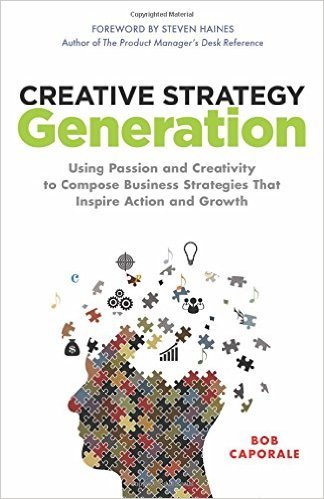
“The topic of strategy tends to get so academic that it intimidates people,” says Bob Caporale. He keeps the discussion light and inspiring by using songwriting as an analogy for creating a business plan. He shares the approach in his new book “Creative Strategy Generation: Using Passion and Creativity to Compose Business Strategies that Inspire Action and Growth.”
Caporale says he has played music as a hobby since age 9, from formal piano studies to rock bands, and gravitated as an adult to composing and songwriting. “There is an analogy between music and business,” he says. “When you write music, you’re basing the foundation of the song on knowledge you have of music theory. You put a new twist on it to create something unique. When you can make that connection between composing and developing business strategy, people can relate and apply it and it’s more fun,” he says.
While Caporale’s day job is President of Sequent Learning Networks in New York, where he helps businesses develop product and management strategies, he says the wisdom his book shares is based more on his previous experiences in management, marketing, and strategic planning at large companies.
The 7-step strategic planning process he outlines, however, is just as applicable to small business owners, he says. But before getting to those steps, Caporale recommends any business leader develop the skills necessary to walk them. “A lot of people want to jump right into the meat, the steps, but first you have to work on the mindset and skills you need to have to get the most out of the steps.”
Leaders who want to plan strategy, he says, must first develop the ability to understand the past, present, and future—to assess “where have we been, where are we now, where do we want to go?”—as well as to visualize the path forward—“how are we going to get there?”
Caporale labels the four skills for answering those questions with words that fit tidily into a musical acronym: ARIA. It stands for “analysis, recollection, intuition, and artisty.”
He calls that last proficiency “the most critical to bringing a strategy to life … that unseen force that drives people not only to act, but to act differently—from their past, from their present, from their otherwise predestined future.” It’s all about that passion and creativity in the book’s subtitle.
Those 7 steps? Preparation, inspiration, genre (as in musical genre or customer preference), ideation, arrangement (into a story that can be told), orchestration (with other people), and production. He offers a chapter on each. “Don’t get bogged down by the music analogy,” Caporale says. “It’s not about writing strategy like a song, it’s about applying the creative process to planning as you would to any creative process, such as painting a picture. Each of the 7 steps applies to the creative process, and if you follow them you will have a creative outcome.”
Watch Bob Caporale talk about creative strategy here.




